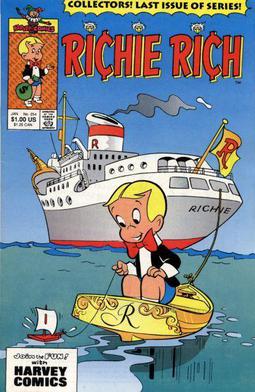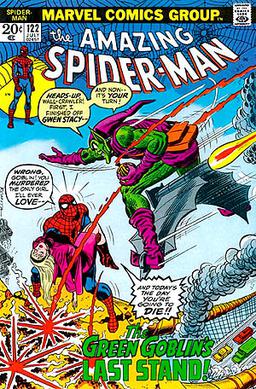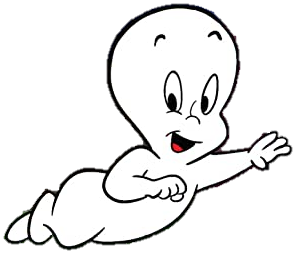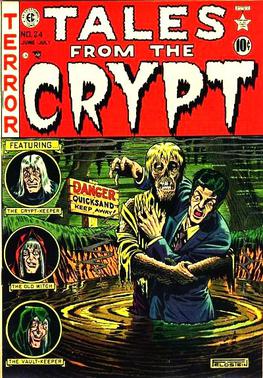
Archie Comic Publications, Inc., is an American comic book publisher headquartered in Pelham, New York. The company's many titles feature the fictional teenagers Archie Andrews, Jughead Jones, Betty Cooper, Veronica Lodge, Reggie Mantle, Sabrina Spellman, Josie and the Pussycats and Katy Keene. The company is also known for its long-running Sonic the Hedgehog comic series, which it published from 1992 until 2016.

Richard "Richie" $ Rich Jr. is a fictional character in the Harvey Comics universe. He debuted in the comic book Little Dot #1, cover-dated September 1953, and was created by Alfred Harvey and Warren Kremer. Dubbed "the poor little rich boy", Richie is the only child of fantastically wealthy parents and is the world's richest kid. He is so rich, and his middle name is a dollar sign, $.
A British comic is a periodical published in the United Kingdom that contains comic strips. It is generally referred to as a comic or a comic magazine, and historically as a comic paper.

Sabrina the Teenage Witch is a comic book series published by Archie Comics about the adventures of a fictional American teenager named Sabrina Spellman. Sabrina was created by writer George Gladir and artist Dan DeCarlo, and first appeared in Archie's Madhouse #22. Storylines of the character at elementary-school-age also appear under the title "Sabrina -- That Cute Little Witch" in almost all of the Little Archie comics.

Marvel UK was an imprint of Marvel Comics formed in 1972 to reprint US-produced stories for the British weekly comic market. Marvel UK later produced original material by British creators such as Alan Moore, John Wagner, Dave Gibbons, Steve Dillon, and Grant Morrison.

Harvey Comics was an American comic book publisher, founded in New York City by Alfred Harvey in 1941, after buying out the small publisher Brookwood Publications. His brothers, Robert B. and Leon Harvey, joined shortly after. The company soon got into licensed characters, which, by the 1950s, became the bulk of their output. The artist Warren Kremer is closely associated with the publisher.

Wendy the Good Little Witch is a fictional comic book character from Harvey Comics. Like Casper the Friendly Ghost and Hot Stuff the Little Devil, Wendy is an opposite-type character, a girl witch who does good deeds.

Little Audrey is a fictional character, appearing in early 20th century comics prior to starring in a series of Paramount Pictures' Famous Studios cartoons from 1947 to 1958. She is considered a variation of the better-known Little Lulu, devised after Paramount decided not to renew the license on the comic strip character created by Marjorie Henderson Buell. Despite some superficial similarities between the two characters, the Famous animators were at pains to design Audrey in contrast to Lulu, adopting an entirely different color scheme and employing the stylistic conventions common to Famous Studios' later 1940s repertoire, as opposed to Buell's individualistic rendering of Little Lulu. Veteran animator Bill Tytla was the designer of Little Audrey, reportedly inspired by his daughter Tammy. The original voice of Little Lulu was performed by actress Cecil Roy. Little Audrey was, instead, voiced by Mae Questel, who also voiced most of Paramount's other major female cartoon characters, including Betty Boop and Olive Oyl from the Popeye cartoons.

Hot Stuff the Little Devil is a comic book character created by Warren Kremer who first appeared in Hot Stuff #1, published by Harvey Comics. Imbued with a mischievous personality and able to produce fire, Hot Stuff appears as a red child devil who wears a diaper and carries a magical sentient pitchfork, which is a character in its own right. Much to the consternation of his demonic brethren, Hot Stuff sometimes performs good deeds to irritate them.

The Bronze Age of Comic Books is an informal name for a period in the history of American superhero comic books, usually said to run from 1970 to 1985. It follows the Silver Age of Comic Books and is followed by the Modern Age of Comic Books.
Little Lotta is a fictional character published by Harvey Comics from 1953 to 1972, and then sporadically until 1993. A contemporary of Little Audrey, Little Dot and Wendy the Good Little Witch, she was one of Harvey's best-known female characters during the 1960s and featured in many of the company's child-friendly comedy titles. Like many of Harvey's comic headliners, Lotta was notable for a quirky defining characteristic - in this case, an insatiable appetite giving rise to superhuman strength.
Planet of the Apes comics are tie-ins to the Planet of the Apes media franchise. They have been released by several publishers over the years and include tie-ins and spin-offs.
The "DC Explosion" and "DC Implosion" were two events in 1978 – the first an official marketing campaign, the second a sardonic reference to it – in which DC Comics expanded their roster of publications, then abruptly cut it back. The DC Explosion was part of an ongoing initiative at DC to regain market share by increasing the number of titles they published, while also increasing page counts and cover prices. The so-called "DC Implosion" was the result of the publisher experiencing losses that year due to a confluence of factors, and cancelling a large number of ongoing and planned series in response. The cancellations included long-running series such as Our Fighting Forces, Showcase, and House of Secrets; new series introduced as part of the expansion such as Firestorm and Steel: The Indestructible Man; and announced series such as The Vixen which would have been the company's first title starring an African-American woman. Former flagship series Detective Comics was also considered for cancellation. Some of the material already produced for these cancelled series was used in other publications. Several of the completed stories were "published" in small quantities as two issues of Cancelled Comics Cavalcade, whose title was a reference to DC's Golden-Age Comic Cavalcade series.
TV Century 21, later renamed TV21, TV21 and Tornado, TV21 and Joe 90, and TV21 again, was a weekly British children's comic published by City Magazines during the latter half of the 1960s. Originally produced in partnership with Gerry and Sylvia Anderson's Century 21 Productions, it promoted the company's many science-fiction television series. The comic was published in the style of a newspaper of the future, with the front page usually dedicated to fictional news stories set in the worlds of Fireball XL5, Stingray, Thunderbirds, Captain Scarlet and the Mysterons and other stories. The front covers were also in colour, with photographs from one or more of the Anderson series or occasionally of the stars of the back-page feature.

Casper the Friendly Ghost is the protagonist of the Famous Studios theatrical animated cartoon series of the same name. He is a translucent ghost who is pleasant and personable, but often criticized by his three wicked uncles, the Ghostly Trio.
Tuff Ghosts Starring Spooky is an American comic book series, published by Harvey Comics. The series ran from July 1962 to October 1972; in all, 43 issues were published.
Spooky Spooktown is an American comic book series, published by Harvey Comics. The series ran from September 1961 to December 1976; in all, 66 issues were published.

Horror comics are comic books, graphic novels, black-and-white comics magazines, and manga focusing on horror fiction. In the US market, horror comic books reached a peak in the late 1940s through the mid-1950s, when concern over content and the imposition of the self-censorship Comics Code Authority contributed to the demise of many titles and the toning down of others. Black-and-white horror-comics magazines, which did not fall under the Code, flourished from the mid-1960s through the early 1980s from a variety of publishers. Mainstream American color comic books experienced a horror resurgence in the 1970s, following a loosening of the Code. While the genre has had greater and lesser periods of popularity, it occupies a firm niche in comics as of the 2010s.
Sad Sack Laugh Special is an American comic book series, published by Harvey Comics.